Mitigation Mosaic: How small steps can make a difference
Posted on 14 January 2014 by BaerbelW
I live in Fellbach (pop. 44,200 in 2011) in southern Germany’s Baden-Württemberg. The town covers an area of 2,770 hectares (ha) of which 1,296 ha are used for agriculture, 163 ha for vineyards, 316 ha are forested and the rest is used for housing, light industry, streets and other purposes. The town lies at an altitude of 288m (center) and its highest point is the Kappelberg at 469m. Fellbach is located close to Stuttgart which is the capital city of the state of Baden-Württemberg.
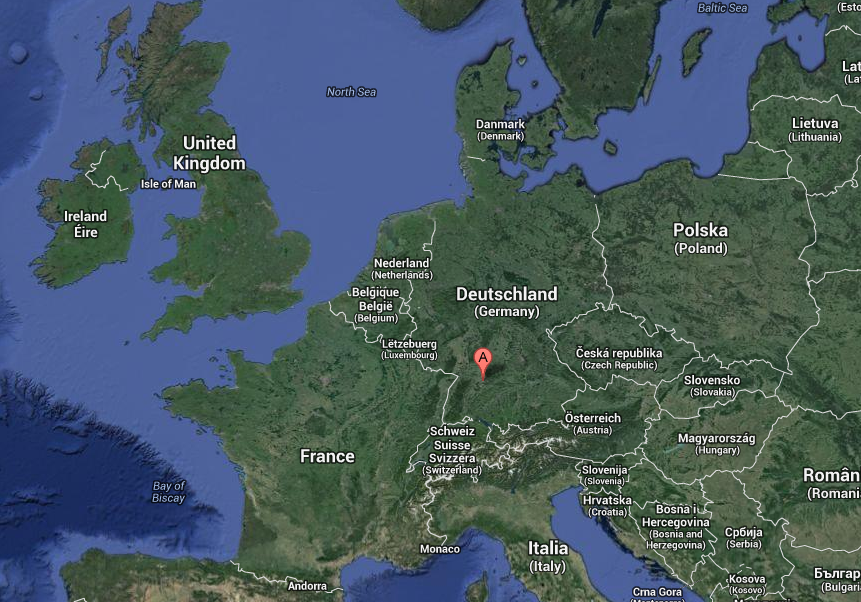
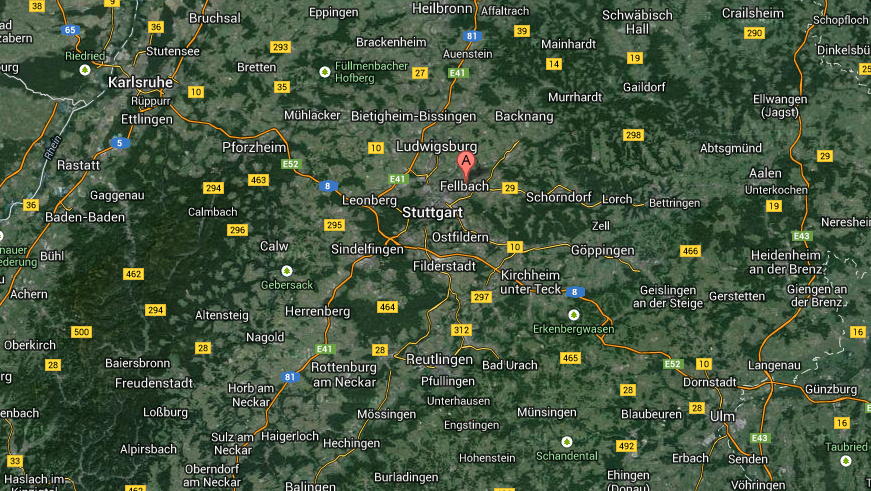
Introduction
Even though this region hasn’t yet seen pronounced negative effects of climate change – and perhaps may not even be hit as hard as others in the future – the town and its local energy provider (Stadtwerke Fellbach) have been pro-active in establishing mitigating strategies since the second half of the 1990s. Fellbach has the advantage that it owns the majority of the local energy provider “Stadtwerke Fellbach” and can therefore set the general direction of how energy is sourced. A major decision was already taken back in the second half of the 1990s when Fellbach decided to make its administration CO2-neutral by the year 2012 (a goal already reached in 2010). And, in 2007 the town council unanimously voted to work towards further decreasing CO2 emissions across town by another 10% over the next 10 years by encouraging mitigation activities on privately owned premises. In order to support this, €10m will be made available from the town’s budget.
Tangible mitigation activities since 1995
In 1995 the Stadtwerke opened the first natural gas filling station for cars in the region and several of the town's municipal vehicles have been converted to make use of this since then, but the -filling station is available for everybody driving such a car (avoided CO2 in 2012: 352 tonnes (t)).
In 1997, they started to install local gas-powered combined heat and power plants (also called co-generation) across and some outside of town. Most of them make use of natural gas but some built in 2009 utilize bio-gas from a local biogas plant (avoided CO2 in 2012: 2,900t).
In 2000 a small wind farm was built on the Swabian Jura, which is a low mountain range in Baden-Württemberg, the profile of which resembles a high plateau, which slowly falls away to the southeast. The northwestern edge is a steep escarpment (called the Albtrauf or Albanstieg, rising up 400 m (1,300 ft), covered with forests), while the top is flat or gently hilled. In the years since 2001, the wind farm has had an average annual yield of 3.4 Million kWh which translates to about 1,800t of avoided CO2 per year.
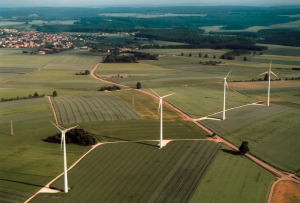 Windfarm on the Swabian Jura (Picture: © Stadtwerke Fellbach)
Windfarm on the Swabian Jura (Picture: © Stadtwerke Fellbach)
In the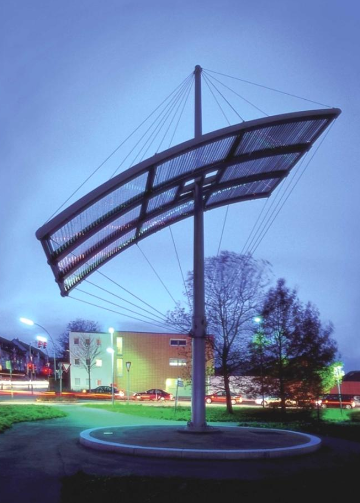 early 2000s an installation named “solar sail” was built which apart from being artistic, provides some of the warm water for an adjacent complex of 25 buildings. Collectors on the buildings’ roofs provide additionally needed warm water. The total area of both the solar sail and the collectors on the roofs covers 230m2. This provides 100,000 kWh equivalent of heat which represents 21t of avoided CO2 per year. Together with other means like proper insulation of the buildings, utilizing localized co-generation of heat and power, the total of avoided CO2 emissions per year is 79t.
early 2000s an installation named “solar sail” was built which apart from being artistic, provides some of the warm water for an adjacent complex of 25 buildings. Collectors on the buildings’ roofs provide additionally needed warm water. The total area of both the solar sail and the collectors on the roofs covers 230m2. This provides 100,000 kWh equivalent of heat which represents 21t of avoided CO2 per year. Together with other means like proper insulation of the buildings, utilizing localized co-generation of heat and power, the total of avoided CO2 emissions per year is 79t.
Solar Sail (Picture: © Stadtwerke Fellbach)
Since 2004, the Stadtwerke have been putting solar photovoltaic installations on their own and other companies’ roofs in and around Fellbach. These 21 installations produced 391,000 kWh of electricity in 2012, translating to 201t of avoided CO2. Some of the installations were publicly co-financed when citizens were invited to buy one or more of the modules installed. Those who did, receive a small annual dividend dependent on the modules' yield.
In 2009, a local biogas plant was built and it has been producing biogas since then from substrates delivered from 9 local farmers (mostly from corn but also grasses and liquid manure). An obvious and visible downside of the plant is that many fields have been converted to grow corn which can reduce the area's biodiversity. Local conservation groups are keeping an eye on this to ensure that this is at least kept in check.
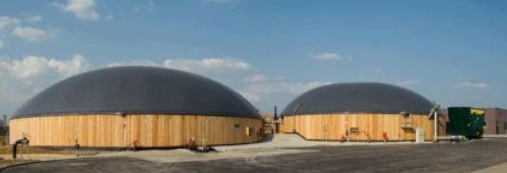
Biogas plant in Fellbach (Picture: © Stadtwerke Fellbach)
The produced gas and heat is used via co-generation plants by two nearby school centers and community halls as shown in this schematic:
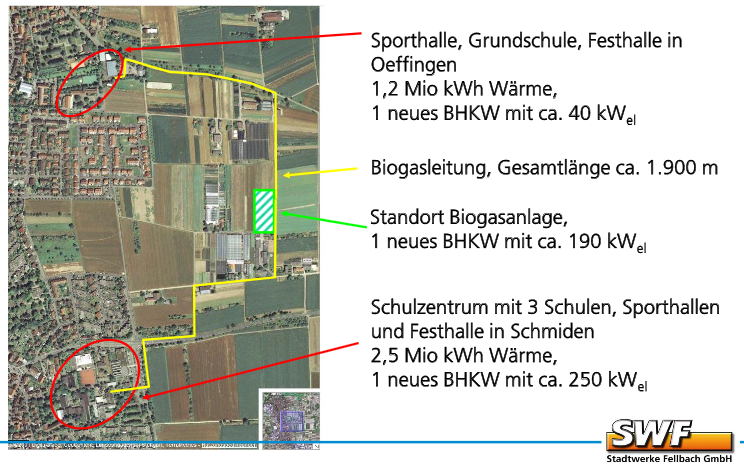 Highlighted in green: location of the biogas plant and a new co-generation plant with ca. 190 kWel/ highlighted in red: the two school centres with 1.2m kWh heat and a new co-generation plant with ca. 40 kWel in Oeffingen (top) and with 2.5m kWh heat and a new co-generation plant with ca. 250 kWel in Schmiden (bottom) / highlighted in yellow: the biogas pipeline with a length of ca. 1,900 meter (Oeffingen and Schmiden are two districts of Fellbach)
Highlighted in green: location of the biogas plant and a new co-generation plant with ca. 190 kWel/ highlighted in red: the two school centres with 1.2m kWh heat and a new co-generation plant with ca. 40 kWel in Oeffingen (top) and with 2.5m kWh heat and a new co-generation plant with ca. 250 kWel in Schmiden (bottom) / highlighted in yellow: the biogas pipeline with a length of ca. 1,900 meter (Oeffingen and Schmiden are two districts of Fellbach)
The expected annually avoided CO2 emissions are 1,340t (already included in the number quoted above for co-generation).
In addition to these tangible installations, the Stadtwerke also offer 100% eco-power to their customers (one of which is the town itself). Since 2008, this has been sourced from 100% hydro power bought from power plants located at the Rhine (until 2011) or in the Swiss Alps (2012).
Another interesting service our Stadtwerke offer is energy consulting. This makes it possible for people living in Fellbach to get a first assessment free of charge if they for example plan to have solar voltaic cells installed on their house’s roof, or to have the house or parts of it insulated.
Even not taking into account avoided CO2-emissions from utilizing the bought aqua-power, the town of Fellbach managed to avoid over 7,000t of CO2 in 2012. And I’m sure that this number will rise steadily over the coming years as more mitigation activities are already in the works. One newly approved measure will for example be the gradual replacement of the old and inefficient streetlighting systems with much more energy-efficient LED lights. This replacement is scheduled to start in 2014 and will take a couple of years to complete.
Scalability and Adaptability
Fellbach is just one of many towns, cities and regions in Germany which has these types of activities going and even though it will not be possible to completely source all of Fellbach's electricity needs from renewable sources in the forseeable future, it is nonethelss moving in the right direction. Due to the patchwork nature of possible activities this is also a very flexible approach which can be custom-made to fit almost any town’s needs as far as scope and scale goes. Activities like those deployed in Fellbach are part of many "bottom-up" steps along the way as Germany transitions to more renewable energy sources in the years to come. And every kw/h no longer sourced from fossil fuels is helping to reach this goal.
Footnotes and Sources
Statistics provided by the town: http://www.fellbach.de/html/seiten/output_adb_file.php?id=1741
Presentation „Stadtwerke Fellbach“ page 2 - http://www.stadtwerke-fellbach.de/download/Klimaschutz_SWF.pdf
Climate protection plan town of Fellbach - http://www.fellbach.de/text/327/de/klimaschutz.html
Information about wind energy from Stadtwerke Fellbach - http://www.stadtwerke-fellbach.de/umwelt/windenergie/
Information about solar from Stadtwerke Fellbach - http://www.stadtwerke-fellbach.de/umwelt/solar/
Presentation „Stadtwerke Fellbach“ page 12 - http://www.stadtwerke-fellbach.de/download/Klimaschutz_SWF.pdf
Information about solar voltaic from Stadtwerke Fellbach - http://www.stadtwerke-fellbach.de/umwelt/fotovoltaik/235.html
Information about biogas from Stadtwerke Fellbach: http://www.stadtwerke-fellbach.de/umwelt/biogas/
Information about hydro power from Stadtwerke Fellbach: http://www.stadtwerke-fellbach.de/umwelt/oekostrom/
Some additional and current information – especially about the avoided CO2-emissions in 2012 was obtained via email directly from the Stadtwerke.































 Arguments
Arguments






























BaerbelW - Thank you for this description of practical steps that any community can take to reduce their fossil fuel use through energy efficiency and renewable energy, and begin to address climate change. Given the paralysis at the Federal level here in the U.S., mixed progress at the State level, and the insufficiency of relying on individual actions, it seems that the most productive way forward is from leadership at the community level.
My town of Lafayette, Colorado, USA is well behind Fellbach but is now on the verge of doing something similar, namely allocating significant resources from the town budget toward reducing greenhouse gas emissions by residents, businesses, and government through investments in EE and RE. A handful of passionate citizens who want to get something done began pressing for such an action last year, and it has been a lot of work (including passing a "citizen initiative" at the ballot in November), but now it looks very promising that Lafayette will soon be starting on the path that Fellbach has taken. One lesson is that individuals really can make a difference, which brings to mind this quote:
One commonality with Fellbach is that we propose offering free energy consultations so that any resident or business can learn what EE measures they can take and how much it will save them on their energy bills, at no risk or cost to them, in order to get the ball rolling on actions. Mostly, though, it's not about give-aways, it's about education. We're promoting the following principles of successful programs aimed at high participation rates: 1) massive public outreach and education from many angles, sustained over time, about available programs and how people will benefit from them; 2) make it super-easy for people to participate once they understand the benefits; and 3) provide financing so that there is no or low upfront cost and payments come from energy savings (for example, establishing a low-interest revolving fund operated by the City, possibly with on-bill repayment).
We are confident that City Council will soon pass a Clean Energy Ordinance that establishes an Energy Sustainability Fund aimed at reducing greenhouse gas emissions and saving people a lot of money by not purchasing unnecessary energy. We're describing this idea in terms of a "City Service", not unlike other social benefits that the City invests in, like the Library and parks and the Rec Center. As the Fellbach article states, this community-level approach to energy sustainability is both scalable and adaptable, and Lafayette's on-going experience shows that it can all begin with just one or a handful of committed citizens who want to get something done on climate change.
From Felbach's point of view, the real significance of this is if/when the ecological and/or economic brown stuff hits the wind pusher, they will be sitting pretty while all around them will wish they had done the same.
Direct action as it should be applied
Great post, Baerbel!
There is a new, useful overview of Germany's overall path here.